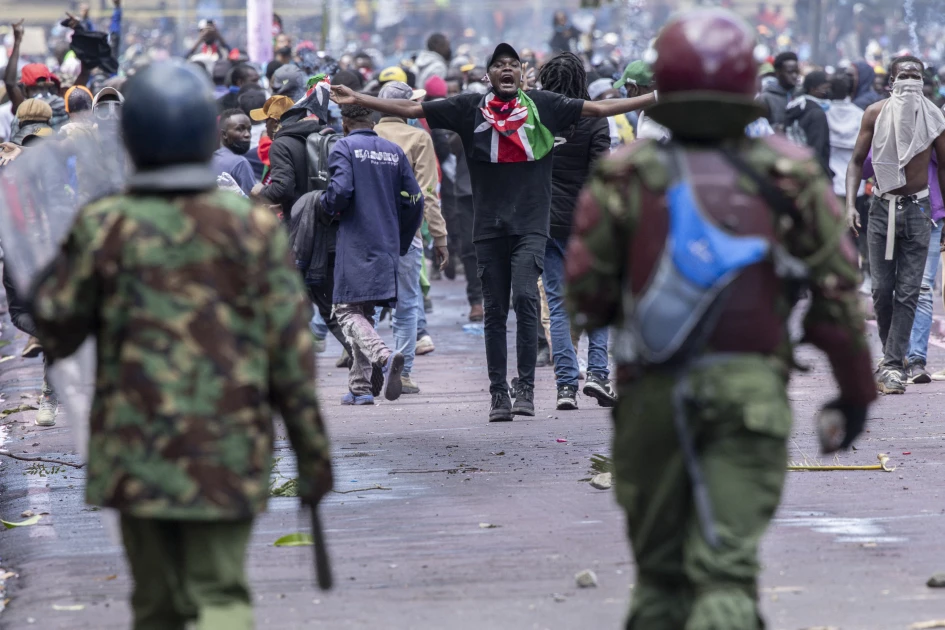OPINION: BWIRE - Attacks on journalists unacceptable and criminal

A protester shouts as he tries to advance towards the police during a demonstration in Nairobi, on June 25, 2024. (Photo by SIMON MAINA / AFP)

Audio By Vocalize
"I was born a Kenyan before becoming a journalist! Why do the police think I should not get involved in things affecting Kenyans, and above all do my legitimate work as a journalist?"
An irritated journalism student covering the FinanceBill2024 protest called me desperately. He had been arrested while covering the protests in Nairobi, his press card destroyed and made to spend at the Central Police Station for one night. He was truly traumatised and frustrated by the experience.
“I think Media Council of Kenya needs to have a massive sensitization and training of police officers on the rights and privileges of journalists covering national public interest issues. So police in their right thinking want journalists not to cover national protests of this national importance”
"Why would the police think journalists are a threat to the country while knowing the cause of the protests were not journalists”, a journalist, who had been hit and injured by a tear gas canister wrote to me.
“Why is that when we have national security threats like terrorism
attacks and threats, the security agencies seek or cooperation and
understanding, but when we have protests against the government, they target
journalists- what changes”, a journalist from Taita Taveta noted this while
narrating his ordeal at the hands of the police even after showing his MCK
press card.
Scenes of beaten and bleeding journalists and photographers, colleagues, journalists jumping out of police moving vehicles, damaged media equipment, traumatised and harassed journalists are among the worst human rights violations documented during the protests, that were broadcast live across communication challenges inside and outside Kenya, but the police firmly believed the enemy was the media.
That a trained security officer, who earlier in the day had been briefed and taken through the forces standing orders could turn into injuring a fellow Kenyan assigned to cover the protests, who could easily be their young brother or sister doing their job for whatever reason is unimaginable, inhuman and the most insensitive act from a professional police officer.
Dealing with such protests and issues requires intelligence-based and democratic policing, where officers use modern ways of crowd dispersal, management and containment, away from the wait and shoot / injure approach that we are using.
Professionalism and Decency must prevail in such cases especially when it comes to dealing with journalists, who in most cases have national IDs, media house staff identification and branded equipment and MCK press card.
Journalists and media practitioners remain subjects of harassment threats, intimidation, and attacks because of their legitimate work of gathering and analysis of information citizens of national issues of concern, without which even if they did not happen, would still happen.
Even if the media gave the protests a blackout, would the protests not have happened? This miscaption that stopping the media from covering public interest issues will stop citizens demanding accountability is misleading.
In fact, in some countries, media reports and analyses as part of the intelligence of the country that inform effective responses to such national crises.
The irony and pretense of these attacks against the media is always immediately seen when after beating journalists in the streets, the same journalists were invited for pressers in the offices.
What changes- the work of the journalists doesn’t include pleasing people, working on red carpets and posh beach hotels- but on the streets, deserts, flooded areas, crimes scenes and development project areas- to report from the front lines not necessarily on edited speeches and curated news. Journalists are first line responders and are covered internally with legitimate privileges that come with their work.
The harassment of journalists violates several Constitutional provisions in Kenya including, Article 25 (freedom from torture and degrading treatment), Articles 28 (freedom to be treated with dignity), Articles 29 (freedom to security), Articles 33 (freedom of expression), Articles 34 (media freedoms), Articles 35 (Access to information and Article 41 (labor rights). Kenya is a signatory to both the Universal Declaration of Human Rights (UDHR) and the International Covenant on Civil and Political Rights (ICCPR) whose Article 19 provides for the right for media freedom.
UNESCO Member States passed Resolution 29 on “Condemnation of violence against journalists”. UN Security Council Resolution 1738 (2006) condemns attacks against journalists in conflict situations.
Among the tips given for journalists covering riots, protests and demonstrations include; maintain control of your life and movements, making clear decision to stay or withdraw from the scene, select pre-arranged positions to cover from ahead of the protestors, once gas/bullets start being fired, exit, never confront demonstrators or looters / security personnel, establish prior knowledge of risks involved in covering the protests and region and having protective gear.
In addition, journalists are advised to work in groups with colleagues, carry identification visible- (MCK and Employer card / water, handkerchief, remain neutral and impartial in the coverage, always remaining in outer edge of the protest among others.


Leave a Comment